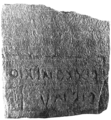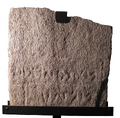VB·22 Stresa: Difference between revisions
From Lexicon Leponticum
Jump to navigationJump to search
No edit summary |
No edit summary |
||
| Line 21: | Line 21: | ||
|source_detail=Morandi 2004: 563 f. no. 65 | |source_detail=Morandi 2004: 563 f. no. 65 | ||
|checklevel=1 | |checklevel=1 | ||
|problem=Datierung, original size | |problem=Datierung, original size, Mainardis 2009 into other commentaries, Agostinetti on the stones | ||
}} | }} | ||
==Commentary== | ==Commentary== | ||
Image in {{bib|De Giuli 1979}}: 246, fig. 1 (photo). | Image in {{bib|De Giuli 1979}}: 246, fig. 1 (photo). | ||
Fragment (upper part) of a mica schist stela, found together with [[VB·23 Stresa]], [[VB·24 Stresa]], [[VB·25 Stresa]]; see [[Brisino]] for the find circumstances and context. The original shape/size of the stone is unclear, but was clearly different from that of the stelae with Latin inscriptions from Brisino ([[VB·24 Stresa]], [[VB·25 Stresa]]) and both epichoric and Latin documents from [[Levo]]. {{bib|De Giuli 1979}}: 251 mentions the possibility that the Brisino stones may come from the same site as the finds in [[Levo]]. Dating according to {{bib|Tibiletti Bruno 1979}}: 254; Morandi says late 2<sup>nd</sup> c. BC. See also '''{{bib|Caramella & De Giuli 1993}}: 207'''. | Fragment (upper part) of a mica schist stela, found together with [[VB·23 Stresa]], [[VB·24 Stresa]], [[VB·25 Stresa]]; see [[Brisino]] for the find circumstances and context. The original shape/size of the stone is unclear, but was clearly different from that of the stelae with Latin inscriptions from Brisino ([[VB·24 Stresa]], [[VB·25 Stresa]]) and both epichoric and Latin documents from [[Levo]]. {{bib|De Giuli 1979}}: 251 mentions the possibility that the Brisino stones may come from the same site as the finds in [[Levo]]. Dating according to {{bib|Tibiletti Bruno 1979}}: 254; Morandi says late 2<sup>nd</sup> c. BC. See also {{bib|Mainardis 2009}}: 337 f., '''{{bib|Caramella & De Giuli 1993}}: 207'''. | ||
{{bibliography}} | {{bibliography}} | ||
Revision as of 12:11, 15 April 2024
| Object | |
|---|---|
| Classification: | stela |
|
| |
| Material: | stone |
| Size: | height 57 cm, width 52–55 cm, thickness 6 cm |
| Condition: | fragmentary |
|
| |
| Archaeological culture: | La Tène D |
| Date: | 1st c. BC |
| Date derived from: | palaeography |
|
| |
| Site: | Stresa (Verbano-Cusio-Ossola, Piemonte, Italy) |
| Field name: | Brisino |
| Archaeological context: | medieval tomb (Objects: VB·22 Stresa, VB·23 Stresa, VB·24 Stresa, VB·25 Stresa) |
| Coordinates (approx.): | 45° 52' 8.04" N, 8° 33' 29.44" E |
| Find date: | 1975 |
| Current location: | Museo Civico Antiquarium (Mergozzo) |
|
| |
| Inscription: | VB·22 (aśkonetio/pianu) |
|
| |
| Alternative sigla: | Tibiletti Bruno 1981: 14 Solinas 1995: 120 Morandi 2004: 65 |
|
| |
| Sources: | Morandi 2004: 563 f. no. 65 |
Images
Commentary
Image in De Giuli 1979: 246, fig. 1 (photo).
Fragment (upper part) of a mica schist stela, found together with VB·23 Stresa, VB·24 Stresa, VB·25 Stresa; see Brisino for the find circumstances and context. The original shape/size of the stone is unclear, but was clearly different from that of the stelae with Latin inscriptions from Brisino (VB·24 Stresa, VB·25 Stresa) and both epichoric and Latin documents from Levo. De Giuli 1979: 251 mentions the possibility that the Brisino stones may come from the same site as the finds in Levo. Dating according to Tibiletti Bruno 1979: 254; Morandi says late 2nd c. BC. See also Mainardis 2009: 337 f., Caramella & De Giuli 1993: 207.
Bibliography
| Caramella & De Giuli 1993 | Pierangelo Caramella, Alberto De Giuli, Archeologia dell'Alto Novarese, Mergozzo: Antiquarium Mergozzo 1993. |
|---|---|
| De Giuli 1978 | Alberto De Giuli, "Le stele funerarie di Brisino", Bollettino Storico per la Provincia di Novara 69/1 (1978), 13–20. |
| De Giuli 1979 | Alberto De Giuli, "Le stele funerarie di Brisino", Sibrium 14 (1978–1979), 245–252. |


